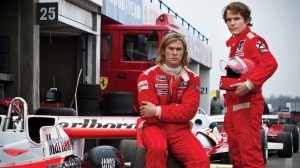 “Men love women,” says a character in Rush, “But even more, they love cars.”
“Men love women,” says a character in Rush, “But even more, they love cars.”
Both cars and women are fully, um, utilized in this movie about Formula One racing, but an even greater love develops over the course of the story: The affection a man feels for his greatest rival.
If there is a general rule of thumb in the movie theater, it would be that movies for men are fast, loud, explosive, and dumb while movies for women are slow, soft, quiet, and, well, also dumb.
Director Ron Howard has made a movie that will appeal more to men than to women, but to say that it’s loud and dumb would be doing it a great disservice.
Loud, yes.
Dumb, no. In fact, it’s quite the opposite, despite its Formula One race track setting.
Rush tells the true, almost unbelievable story of a great 1970s rivalry between Brit James Hunt and Austrian Nikki Lauda. Equally great on the track, their styles could not be more different off it. Hunt, played with great ease by Chris Hemsworth, is a free-wheelin’, full-throttle kind of guy. He never stops to think about, well, anything. It would ruin his charm.
Lauda, played in a fantastic performance by Daniel Bruhl, comes across as cold, calculated, and unfriendly. He assesses each situation, on the field and off, almost like a math problem. Races as well as relationships are subject to a cost-benefit analysis.
Hunt wouldn’t know a cost-benefit analysis if he hit one like a brick wall at full speed.
There could not be an odder odd couple and yet it is their differences and their intense rivalry that propel each to greater heights than they would have met alone. Even in the wake of a devastating crash, their competition becomes, more than any other factor, the thing that gets them on the track driving on the edge of sanity.
This particularly masculine dynamic is explored at great length in the movie. This is not to say women don’t have rivalries. We certainly do. And yet, there is something very masculine about the idea of a great rival becoming the most important person in someone’s life.
Thomas Edison versus Nikola Tesla
Steve Jobs versus Bill Gates
And Hunt verus Lauda.
Each character starts the story as generally unlikable: Hunt flippant and shallow in his libertine ways, Lauda prickly and unappealing. By the end of the film, however, there is a deep affection for each of them. That Howard does this without resorting to changing the essence of each’s character or overly emotive manipulation is a testament to his skill as well as that of the actors. If anything, each man becomes entrenched even more in his own character, but is softened through the lens of the other.
All this layered story perhaps sounds like the movie is a snoozefest, but it’s not. The engines rev and turn, pulses pound with daring zips and turns, and the pretty ladies keep parading through in various states of undress.
Rated R, the movie candidly shows Hunt’s promiscuous ways, complete with partial female nudity. His habit of bedding every attractive woman he sees is embedded deep in his character and not without its consequences. Contrasted is Lauda’s cautious, almost passionless love that grows into something powerful. There’s plenty of salty language as well and some gruesome crash and medical scenes. In fact, 1970s medical procedures in the hospital were the hardest part of the movie to watch.
This will be a movie women will like and men will love.
It’s nice to see a film for the guys that doesn’t feature anorexic chicks in leather hoisting huge guns or fighting robots destroying metropolises.
Good on you, Ron Howard.












